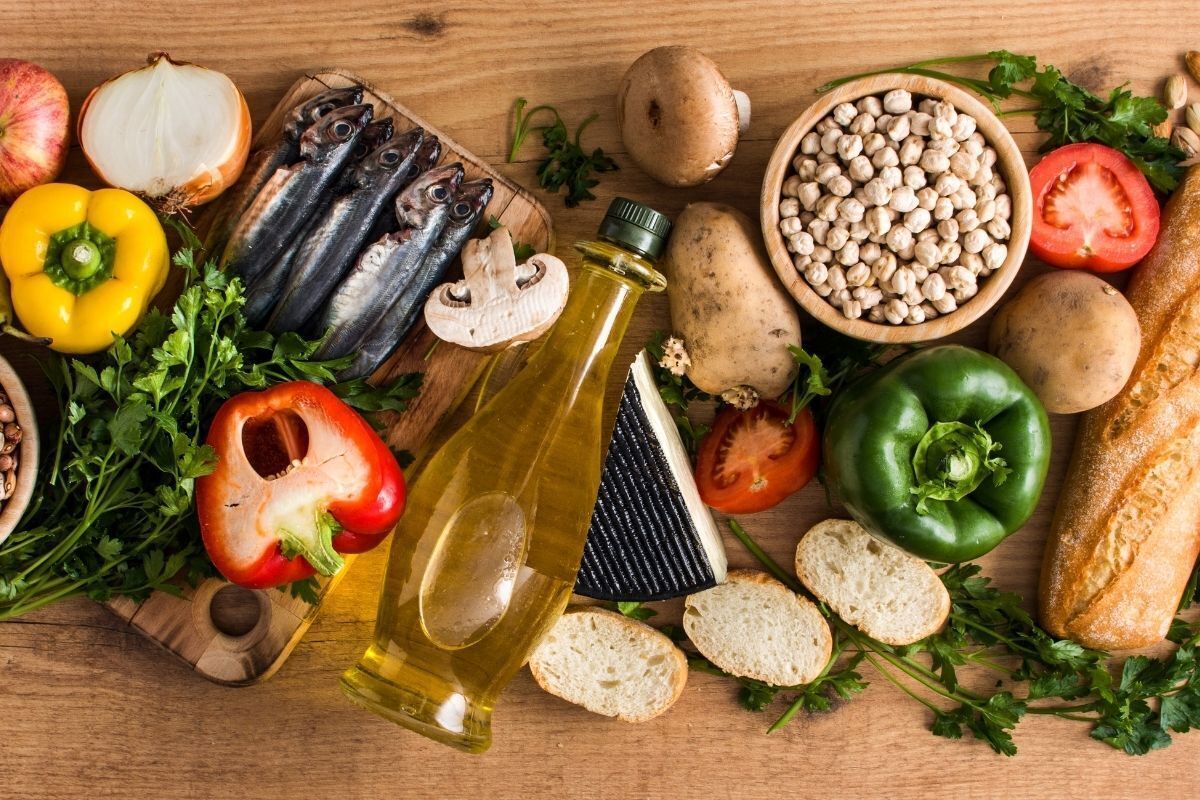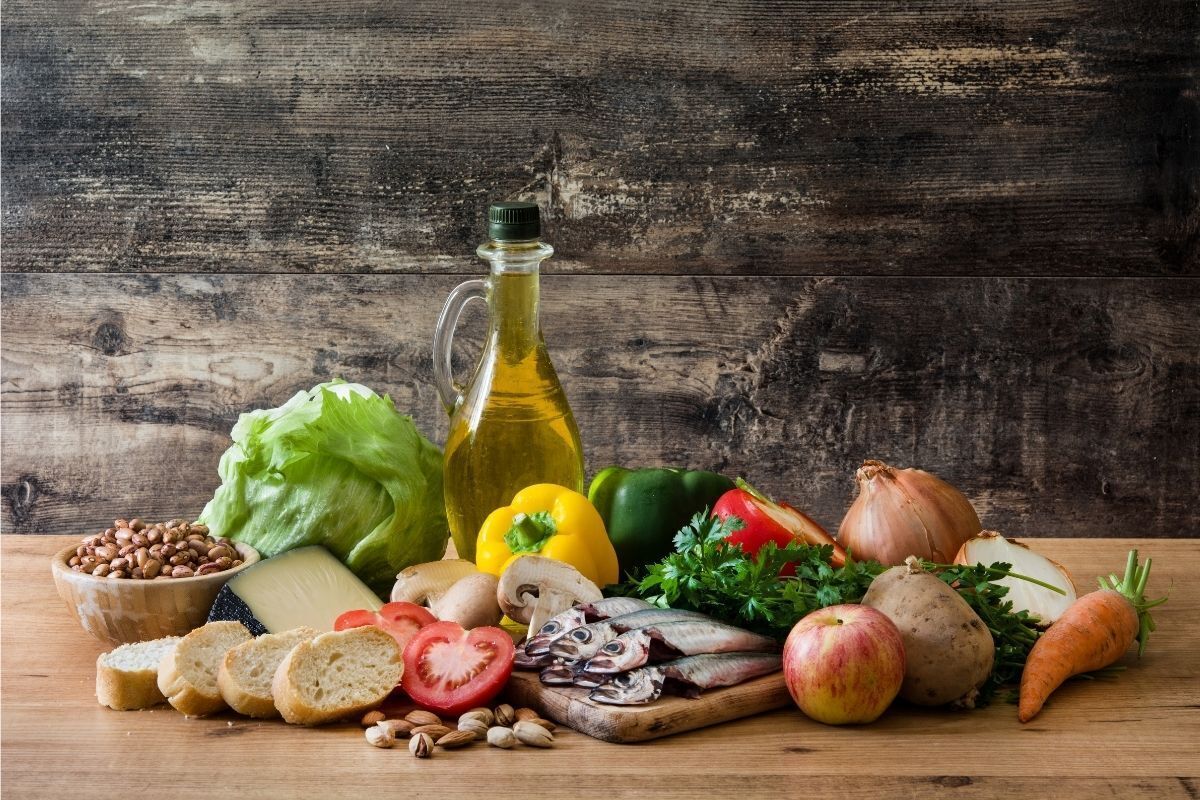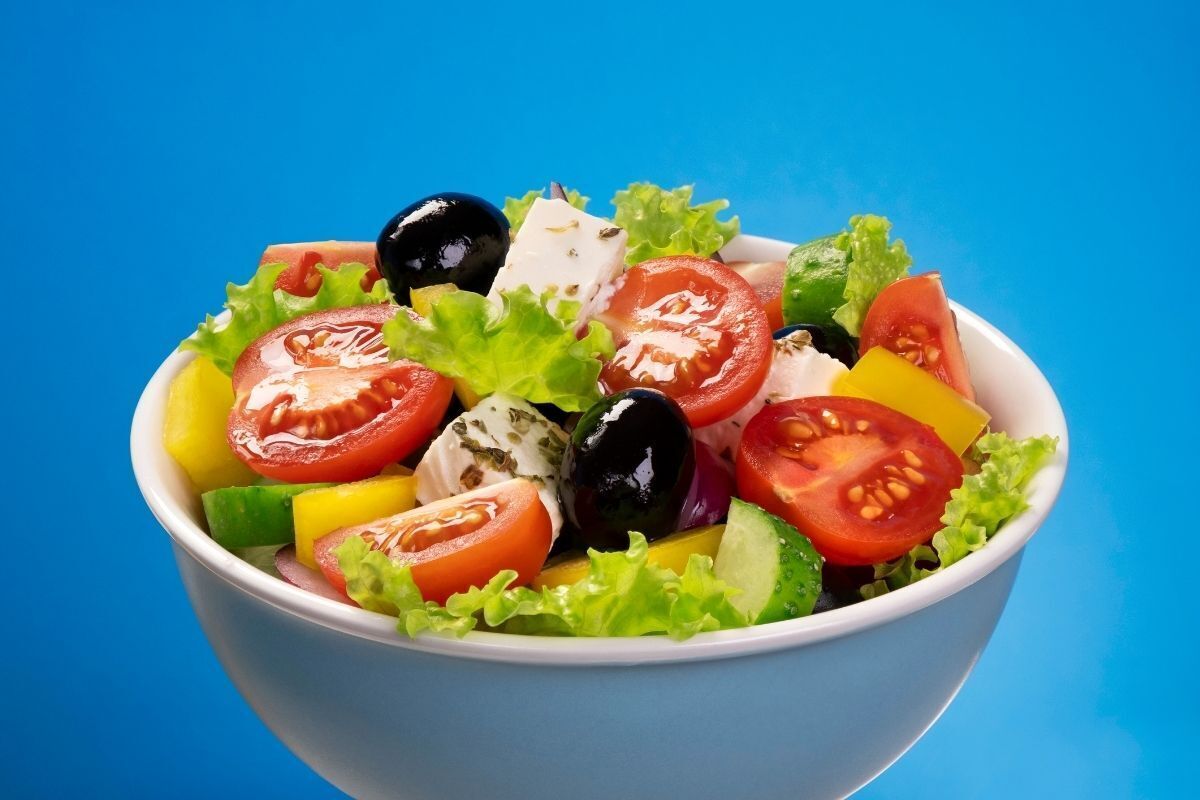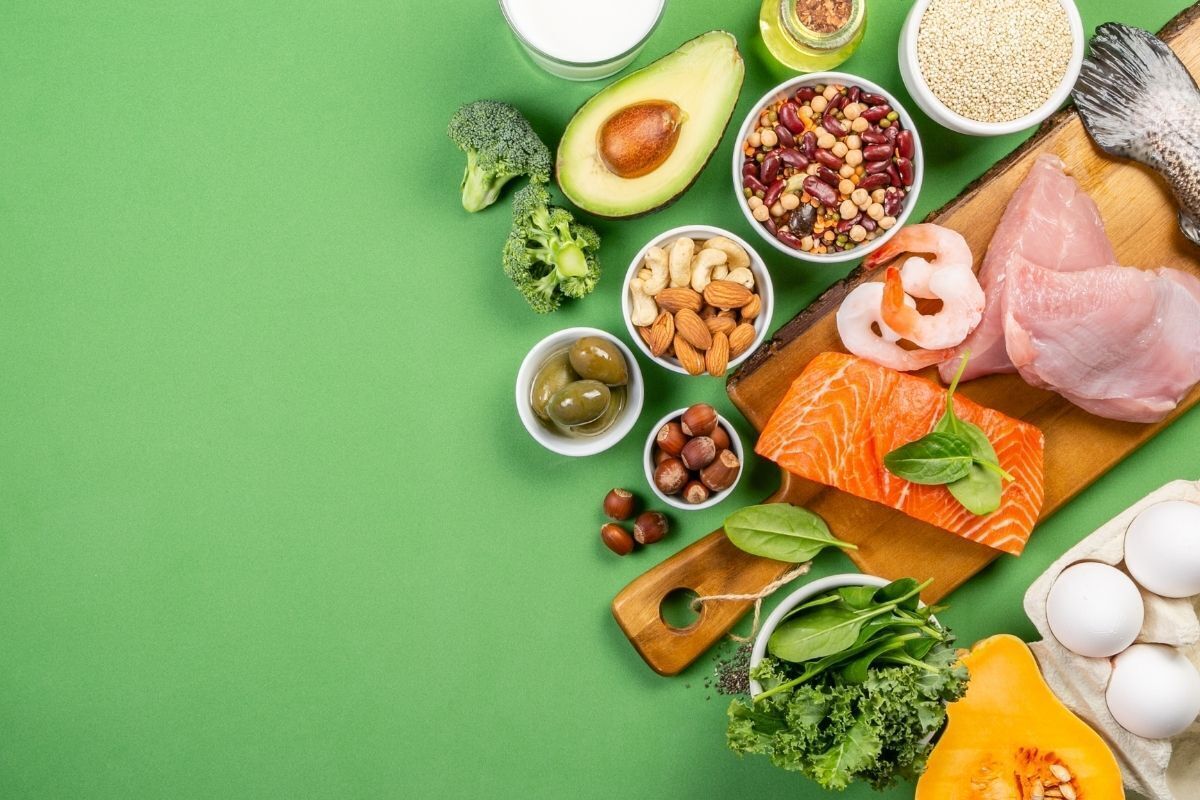Table of contents
General considerations on the Mediterranean diet

The Mediterranean diet, also known as the Mediterranean diet, is based on the lifestyle of the population of a region that has high life expectancy and very low rates of chronic diseases.
The number of healthy individuals in this area is enormous and attracted the attention of scientists, who soon began to study what made this area so special. The region is bathed by the Mediterranean Sea and consists of southern Spain, France, Italy and Greece.
Through research, they discovered that the eating habits and lifestyle of these people were extremely similar and healthy. Keep reading and check out everything about the Mediterranean diet and how to include it in your routine!
Learn more about the Mediterranean diet

The Mediterranean diet is based on natural, fresh and unprocessed foods. Thus, the best places to shop for this lifestyle are neighborhood markets, grocery stores and fairs. Learn more below!
What is the Mediterranean diet
The Mediterranean diet was discovered in the 50s by a team of researchers and gained much prominence thanks to the American doctor Ancel Keys, who conducted several studies in the region bathed by the Mediterranean Sea.
This diet involves fresh foods, excludes processed and ultra-processed foods, and avoids red meat. However, everything starts well before meals, since this population usually plants, harvests, fishes and cooks everything with the help of family members.
Incidentally, a curious fact is that the Mediterranean diet has been considered intangible cultural heritage of humanity by UNESCO since 2010. This recognition is not without reason, as the lifestyle of the locals is closely linked to longevity and good heart health.
How it works
The Mediterranean diet is based on what many call "real food," which includes fruits, vegetables, olive oil, fish and other seafood. Consumption of these foods provides a large amount of nutrients that are highly beneficial to health.
We also find oilseeds, grains and whole grains on the tables of those who follow this eating routine. Low-fat dairy products and cheeses are consumed in moderation, and wine gains a prominent position in one of the meals.
Although it is not a vegetarian diet, the presence of red meat is quite rare. In addition, sausages and ultra-processed foods are forbidden.
Does the Mediterranean diet lose weight?
The Mediterranean diet is often linked to a healthy and less stressful lifestyle, but it is important to stress that it is not aimed at losing weight. Weight loss can happen as a consequence of a more balanced routine.
However, it is worth noting that this eating pattern can also result in a few extra pounds on the scale. To prevent this from happening, you need to eat in moderation and burn calories through regular exercise.
This is because the study also showed that the inhabitants of the Mediterranean usually walk and cycle, that is, they have a set of habits that are far from sedentary.
Can vegetarians and vegans do it?
The Mediterranean diet can be done relatively easily by vegetarians, since vegetables, fruits, cereals, eggs and dairy products are already present in their eating routine. The only point in which an adaptation needs to be made is in the ingestion of poultry and fish.
However, vegans would have a much more complex task. This is because meats, eggs and dairy products would be excluded from the menu. For this group to enjoy the benefits of the diet, vegetable proteins should be taken into consideration.
Vegetarians and vegans can include more mushrooms, black rice, buckwheat, peanuts, cashews, pine nuts, peas, lentils and tofu (soy cheese).
The benefits of the Mediterranean diet

The lifestyle brought by the Mediterranean diet reflects the positive habits adopted by the inhabitants of the countries bathed by the Mediterranean Sea. This way, it offers several health benefits. Check it out!
It's nutritious
The Mediterranean diet provides several nutrients, since it is based on fresh foods, such as fruits and vegetables. Thus, it can be said that it is a source of vitamins, minerals and antioxidants.
By the way, dishes prepared in the Mediterranean region are closely linked to a much healthier body, as it promotes strong bones and heart, providing a long life full of well-being.
A curiosity is that this diet is considered the best to follow for several consecutive years, including in 2022. Every year, the most popular diets in the world are evaluated, and the Mediterranean diet was the champion in many subcategories, such as the healthiest and the easiest to follow.
Reduces the risk of cardiovascular disease
The Mediterranean diet is known to lower the risk of developing cardiovascular disease, as well as protecting the body from atherosclerosis (accumulation of fatty plaques in the arteries) and thrombosis.
According to studies by the University of Barcelona, this change in eating habits could prevent approximately 30% of deaths from heart attacks, strokes, coronary heart disease and other problems related to the cardiovascular system.
These benefits are related to the increased consumption of fruits, vegetables, legumes and whole grains in your eating routine. In addition, since the Mediterranean diet is also a lifestyle, it encourages regular physical activity, which also protects the heart.
Provides variation to the diet
The Mediterranean diet combines a great diversity in the diet with a healthier way of life. It includes several food groups and restricts only the category of processed and ultra-processed food.
In this way, it helps a lot to vary the daily menu. In addition, it is great to encourage healthier eating in children, since it presents very colorful, vibrant and tasty dishes. Thus, the palate gets used to the consumption of fruits, vegetables and greens more easily.
The only groups that need to make minor adaptations are individuals suffering from celiac disease and lactose intolerance, as part of the diet influences the intake of wheat and dairy products.
What to eat in the Mediterranean diet

The Mediterranean diet encourages the consumption of a wide variety of healthy foods, prohibiting only the group of processed and ultra-processed. The intake of plenty of water is also recommended. Check out what you need to have in the pantry and the refrigerator!
Fruits and vegetables
The consumption of fruits and vegetables is a very important point in the Mediterranean diet, since these foods supply fibers, vitamins and minerals to the organism. These nutrients help prevent diseases related to the cardiovascular system and also bring a feeling of satiety, which can help in the weight loss process.
It is recommended to eat 7 to 10 portions of this food group daily, and the ideal is to eat at least 3 different fruits. The tip is to bet on variety: the more colorful the dish is, the better.
Some representatives of this category are: broccoli, cabbage, spinach, onion, cauliflower, carrot, Brussels sprouts, cucumber, okra, apple, banana, orange, pear, strawberry, grape, fig, melon, peach and blueberry.
Nuts and seeds
Nuts and seeds are one of the pillars of the Mediterranean diet. They are present in the main meals of the day and snacks, since they are perfect to satisfy hunger in a healthy and tasty way.
This food group is very rich in vitamins B, C and E complex, acting in the prevention of heart diseases. In addition, it is a source of minerals and good fats, such as mono- and polyunsaturated, stimulating the increase of good cholesterol (HDL).
Some examples of this part of the diet are: almonds, walnuts, hazelnuts, cashews, macadamia nuts, sunflower seeds, pumpkin seeds and pistachios.
Wholemeal products
Whole grain products are the main source of energy in the Mediterranean diet. These foods are in charge of replacing refined carbohydrate, such as white wheat flour.
This substitution is easy to understand, since whole grains are rich in fiber, B and E vitamins, essential fatty acids, fiber and antioxidants. In addition, they have a large amount of minerals such as magnesium, iron, zinc, selenium, manganese, potassium and phosphorus.
Another positive point is the presence of flavonoids, which reduce the risk of developing diabetes. Acting together, the nutrients fight constipation and reduce the absorption of sugars and fats in the intestine. Whole-grain foods, such as rice, flour, oatmeal and pasta are part of this group.
Olive oil and healthy fats
Olive oil is essential in the Mediterranean diet, as it is an excellent source of monounsaturated fatty acid and polyphenols, which help increase good cholesterol (HDL). The use of vegetable oils, such as canola and flaxseed, is also recommended, as it helps prevent cardiovascular diseases.
These oils are a source of vitamin E and selenium, which have a powerful antioxidant action. The indication is to add olive oil in the ready-made preparation, consuming no more than 2 tablespoons a day. It can also be used for cooking, but you can vary it with canola or flaxseed oils. A curiosity is that sunflower oil is rarely consumed.
Poultry, fish and seafood
Poultry, fish and seafood are part of the Mediterranean diet. However, fish gains prominence and is one of the main components of this dietary program, since its consumption is linked to the prevention of heart disease.
Thus, the recommendation is to eat fish or seafood at least 3 times a week. This is because they are a source of protein and good fats, such as omega-3. Thus, they act as an anti-inflammatory, ease joint pain, improve blood circulation and decrease the levels of triglycerides and total cholesterol.
Some examples are: chicken, duck, salmon, sardines, trout, tuna, shrimp, oysters, crabs and mussels.
Low-fat milk, yoghurt and cheese
The group of dairy products, such as milks, yogurts and cheeses, are important items in the Mediterranean diet, provided they are in a low-fat version.
These foods are very rich in calcium and protein, which contributes to the prevention of osteoporosis. The recommendation is to give preference to skim milk and white cheeses, such as goat and sheep, common in the Mediterranean region.
However, these types of cheese can be replaced by minas, ricotta or cottage, found more easily in Brazil. The yogurt should be natural or Greek, without added sugar or artificial flavors. If you want to sweeten a little, put a teaspoon of honey.
Spices
Spices are highly appreciated in the Mediterranean diet, as they help give more layers of flavor to dishes and also contribute to the reduction of salt. The use of aromatic herbs is a trademark of this dietary program. Being a can't-miss item, the variety of herbs and spices used is enormous.
Some of the most common spices are: garlic, basil, mint, rosemary, sage, nutmeg, cinnamon, saffron, cardamom, cumin, dill, fennel, ginger, lavender, bay leaf, oregano, paprika, black pepper, thyme, and pignoli (a small, oval seed often used in the preparation of Genoese pesto, a typical Italian sauce, and dolmas, a grape leaf charcuterie).
Wine
A curious fact of the Mediterranean diet is the recommendation of moderate consumption of wine as an accompaniment to meals. One glass of wine per day (180 ml) is allowed, especially after dinner.
According to the diet, diabetics can take some too, but only from 2 to 4 glasses per week. Wine is liberated because it is rich in antioxidants, such as resveratrol, flavonoids and anthocyanins.
With this, it helps prevent the formation of fat in the arteries, which reduces the risk of cardiovascular diseases. However, the drink is not mandatory, and can be replaced by natural grape juice, made at home.
Menu suggestion for the Mediterranean diet

With so many options of foods allowed in the Mediterranean diet, it is common to get lost when preparing a menu. Therefore, check out some suggestions to vary the flavors and have a different dish every day!
Breakfast
For breakfast on the Mediterranean diet, the options are as follows:
- Fresh herbal tea and a seasonal fruit;
- Mediterranean Sandwich (made with two slices of whole wheat bread, a piece of white cheese, olive oil flavored with herbs and basil, cherry tomatoes, chopped cucumber and sea salt shaken with oregano, thyme and basil);
- 1 glass of skim milk, 1 whole wheat bread with ricotta and 1 slice of papaya;
- 1 cup of banana and apple vitamin (made with skim milk and 2 tablespoons of oatmeal);
- Oatmeal (made with 200 ml of skim milk, 2 tablespoons of oat flakes and 1 tablespoon of cocoa powder).
Lunch
The Mediterranean diet lunch may consist of:
- Green salad with green leaves and sunflower seeds; baked fish with herbs, spices (thyme, nutmeg, rosemary and oregano) and olive oil; cooked brown rice with lentils, mushrooms, oregano and carrots; a portion of fruit (plum, pineapple, orange, tangerine or kiwi);
- Half a slice of grilled salmon, 2 boiled potatoes drizzled with olive oil and sauteed broccoli;
- 1 grilled chicken breast steak with tomato sauce, brown rice and carioca beans;
- Tuna macaroni in pesto sauce, using whole grain noodles;
- Baked fish with herbs, spices and seasoned with olive oil, cooked brown rice with oregano and carrots, green leaf salad.
Snack
The following are suggested snacks for the Mediterranean diet:
- A portion of fruit or a handful of nuts, such as walnuts or almonds;
- Natural skimmed yogurt with fresh berries, a pinch of oat bran and a dash of honey. Mineral water to accompany;
- 3 whole-grain toasts with a drizzle of olive oil and 2 nuts, such as hazelnuts or macadamias;
- 1 glass of green juice of kale, lemon and carrot, accompanied by 3 wholemeal toasts;
- Skim natural yogurt with 1 teaspoon of chia and a drizzle of honey;
- 1 glass of juice of beetroot, carrot, ginger, lemon and apple, and 1 slice of whole wheat bread with ricotta.
Dinner
For dinner on the Mediterranean diet, these are the suggestions:
- Vegetable soup, sardines or tuna with eggplant and red peppers, and a slice of whole wheat bread to go with it;
- 1 chicken thigh cooked with peas, lettuce, tomato and red onion salad, and 1 pear for dessert;
- 1 grilled turkey steak, coleslaw, carrots and beets, and 1 slice of pineapple;
- 1 omelet, kale salad sauteed with onion, garlic and eggplant, and 1 orange;
- Roasted eggplant with tomatoes, red peppers and garlic. Roasted tuna with herb crust and a glass of wine.
Supper
For the Mediterranean diet, the tip is to go lighter. Check out the options:
- Natural skimmed yogurt with granola;
- 1 cup of warm skim milk;
- A portion of fruit;
- One cup of apple tea with cinnamon;
- A portion of seeds or nuts.
However, you can also drink a glass of wine before bedtime.
Advantages, disadvantages and which products to avoid

The Mediterranean diet has several health benefits, but some of the foods that make up the program tend to be expensive in Brazil. It is the case of olive oil, saltwater fish and some nuts. Learn more about the diet below!
The main advantages and disadvantages of the Mediterranean diet
The Mediterranean diet has many advantages, since it is composed of foods rich in vitamins, minerals, fatty acids, mono and polyunsaturated fats, fiber and antioxidants.
Another positive point is the restriction, i.e. the low consumption of saturated fats from red meat and fatty dairy products. In this way, the risk of chronic diseases is greatly reduced, increasing life expectancy.
However, the diet has a disadvantage: the intake of wine, which needs to be moderate to work. Therefore, those who drink more than one glass per day run the risk of suffering from serious diseases, such as cancer and stroke.
Red meat
Red meat can be consumed in the Mediterranean diet, but it is restricted to once a week. Besides, it is necessary to give preference to lean cuts, without fatty parts. Thus, it can be said that this type of protein is eaten only on special occasions, in order to prevent cardiovascular diseases.
Lean cuts of lambs fed only on grass are permitted. However, meats with a high fat content, such as bacon and sausages, are prohibited.
Industrialized products
The main precept of the Mediterranean diet is natural food. Therefore, it is necessary to replace the foods bought ready-made, such as cookies and cakes, giving preference to homemade versions.
Excluding processed products decreases the production of toxins in the body, reducing inflammation and combating fluid retention. Thus, the body naturally deflates.
The ultra-processed products that are left out are: sausages, soft drinks, energy drinks, snacks, biscuits, powdered juice, ready-made frozen dishes, instant noodles, powdered soup and cake mix.
Adopt the Mediterranean diet and enjoy all its benefits!

The Mediterranean diet is full of health benefits and very delicious. Its dishes make anyone's mouth water! In addition, it is democratic, and can be done by people of various ages and backgrounds.
Moreover, as it preaches that the quality of calories is much more important than the quantity, it protects the cardiovascular system, improves cognitive activity, prevents diabetes and even optimizes intestinal transit.
An important point of this diet is that it also proposes a Mediterranean lifestyle, with regular physical activities, relaxation and the adoption of hobbies. With this, not only your body, but also your mind will thank you!

